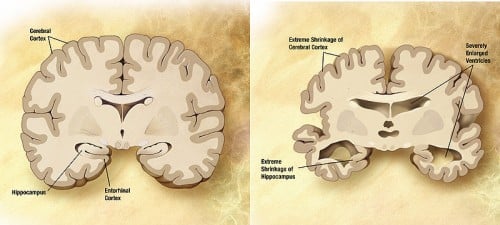The discovery may promote early diagnosis of Alzheimer's through blood tests as well as new treatments for the disease * The study was recently published in the journal Translational Psychiatry

Researchers at Tel Aviv University discovered that the level of the RGS2 gene is significantly reduced in the blood of Alzheimer's patients, and therefore the gene may be used as a basis for diagnosing the disease with a simple blood test. The RGS2 gene has been known to science for many years as being responsible for turning off signals transmitted between nerve cells, but only now has it become clear that it also plays a central role in Alzheimer's disease.
The new discovery may be a significant breakthrough in the study of Alzheimer's disease - the leading cause of dementia in the elderly population, the prevalence of which is constantly increasing with the increase in life expectancy. The importance of the discovery is especially emphasized because to date, despite the great efforts of researchers all over the world for decades, effective early diagnostic tools or effective treatments for Alzheimer's have not yet been found.
The research was led by: Dr. David Gurvitz from the Department of Human Molecular Genetics and Biochemistry at the School of Medicine; Prof. Ilana Gozes, who holds senior research positions at the School of Medicine, at the Adams Center for Brain Research and at the Sagol School of Neuroscience and is in charge of the Lilly and Abraham Gildor Chair for Tumor Factor Research at Tel Aviv University; their joint PhD student Edva Hadar and researcher Dr. Elena Milanzi; In collaboration with Dr. Noam Shumron, head of the Cell Genomic Intelligence Laboratory at the School of Medicine, his student Dr. Dafna Weisglass, and research groups from Italy and the Czech Republic.
The study was recently published in the journal Translational Psychiatry
Decrease in RGS2 gene expression level
Dr. Gurvitz explains: "In recent years, doubts have arisen regarding the amyloid-beta protein as a distinct characteristic of Alzheimer's, because it turned out that it also accumulates in healthy brains in old age. One of the hypotheses put forward to solve the issue was that certain people are more sensitive to the accumulation of amyloid-beta, and therefore they are at a higher risk of getting Alzheimer's."
To test the hypothesis, the researchers took blood cell samples from 28 healthy people, and exposed them in the laboratory to the amyloid-beta protein. Indeed, they identified two groups: the blood cells of some of the subjects showed a high sensitivity (expressed in the inhibition of cell growth) to amyloid-beta, while the other group showed a low sensitivity. Now they asked to check what is the difference between the two groups.
The search for specific differences between the blood cells sensitive to amyloid-beta and those that are not, was carried out using an innovative technology of searching for genes across the entire genome. To their surprise, the researchers discovered a clear characteristic, which so far has never been linked to Alzheimer's disease: the gene RGS2. This gene, it turned out, is found at a lower level in the blood cells that are sensitive to amyloid-beta, compared to the less sensitive cells. Another experiment revealed that blood cells too taken from Alzheimer's patients are characterized by low levels of the RGS2 gene, compared to the blood cells of healthy volunteers of the same age group.
To examine their findings from another angle, the researchers turned to existing databases of gene expression in the blood of Alzheimer's patients and in brain tissues taken from patients after their death. Indeed, the data produced using advanced data mining methods confirm the laboratory results: the expression of the RGS2 gene was indeed found to be lower in the blood and brain tissues of Alzheimer's patients, compared to people who do not suffer from the disease. More than that: it turned out that the distinct decrease in gene expression is already evident in the blood of people in the initial stage of the disease, which is defined as a mild cognitive decline. In other words, for the first time, this is a clear biological marker, which may make it possible to diagnose Alzheimer's patients already at an early stage, and perhaps even distinguish them from people suffering from cognitive decline for other reasons - all through a simple blood test.
"Our discovery may be a breakthrough, which will change the directions of thought and action of Alzheimer's disease researchers," concludes Dr. Gurvitz. "We believe that it has significant potential for the development of future diagnostic tools and even a new type of medication for Alzheimer's disease, which causes enormous suffering to many millions all over the world."

3 תגובות
Very interesting research! Kudos to the research team. Is there an estimate of when the blood test will be available to the general public? (Also. My wife and I are already at an advanced age - and the issue concerns us...)
Fascinating, thank you very much!